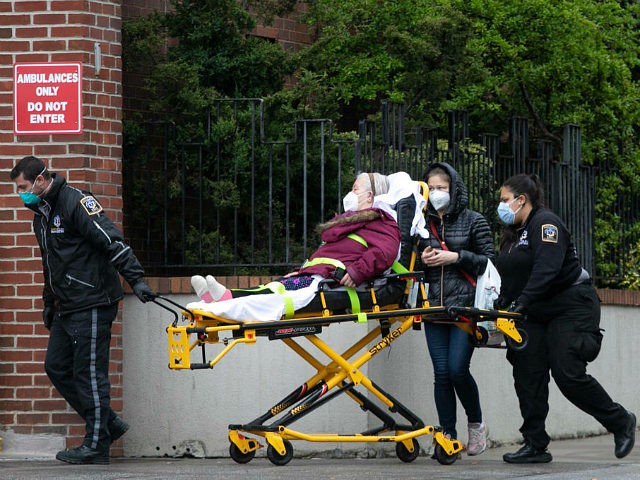Data from the U.S. Centers of Disease Control and Prevention (CDC) suggests that the novel coronavirus’s true fatality rate in the United States, which takes into account mild and asymptomatic cases, stands at 0.26 percent, about eight to 15 times lower than earlier mortality rate estimates of between two and four percent, which prompted the lockdowns.
However, the true (or infection) mortality rate is more than double the flu’s 0.1 percent.
The case (or crude) fatality rate only takes into account confirmed coronavirus cases, excluding people with mild or no symptoms that do not require medical attention.
Meanwhile, the infection fatality rate (IFR) accounts for the estimated number of mild and asymptomatic cases. It tends to be lower than the crude fatality ratio because it shows that more people have contracted the virus without dying.
The 0.26 percent mortality rate (about three in 1,000) linked to COVID-19, the disease produced by the coronavirus, is lower than the death rate predicted by the infamous Imperial College report and other assessments that prompted the lockdowns across America.
Using data contained in a CDC report, last reviewed on May 20, Daniel Horowitz, a senior editor at Conservative Review (CR), noted in an editorial this month:
For the first time, the CDC has attempted to offer a real estimate of the overall death rate for COVID-19, and under its most likely scenario, the number is 0.26%. Officials estimate a 0.4% fatality rate among those who are symptomatic and project a 35% rate of asymptomatic cases among those infected, which drops the overall infection fatality rate (IFR) to just 0.26% — almost exactly where Stanford researchers pegged it a month ago.
…
Ultimately, we might find out that the IFR is even lower because numerous studies and hard counts of confined populations have shown a much higher percentage of asymptomatic cases. Simply adjusting for a 50% asymptomatic rate would drop their fatality rate to 0.2% – exactly the rate of fatality Dr. John Ionnidis of Stanford University projected.
Breitbart News and other analysts verified Horowitz’s calculations.
The CDC data is consistent with other assessments. “By now, multiple studies from Europe, Japan, and the U.S. all suggest that the overall fatality rate is far lower than early estimates, perhaps below 0.1 to 0.4%, i.e., ten to forty times lower than estimates that motivated extreme isolation,” Dr. Scott Atlas, a senior fellow at Stanford University’s Hoover Institution, told lawmakers in early May, referring to the infection rate.
By taking into account mild and asymptomatic cases that were not clinically confirmed, some health analysts have determined that COVID-19 is more widespread but less deadly than early estimates suggested.
Health experts have noted that the faster the disease spreads and hits its peak, the fewer people will die.
In early March, the World Health Organization (W.H.O.), a United Nations component, explained the difference between the crude and infection mortality rates, noting:
Mortality for COVID-19 appears higher than for influenza, especially seasonal influenza. While the true mortality of COVID-19 will take some time to fully understand, the data we have so far indicate that the crude mortality ratio (the number of reported deaths divided by the reported cases) is between 3-4%, the infection mortality rate (the number of reported deaths divided by the number of infections) will be lower. For seasonal influenza, mortality is usually well below 0.1%.
In April, the CDC reportedly placed the crude fatality case at around four percent.
Ultimately, the W.H.O. placed the globe’s crude mortality rate at 3.4 percent. Early in the outbreak, health officials, including Dr. Anthony Fauci from the White House Coronavirus Task Force, had concluded that the crude mortality stood at about two percent.
Fauci is the top infectious disease expert in the United States. There is a patchwork of policies across the U.S. for how to count the number of coronavirus deaths, meaning that the total fatality figure could be higher or lower than the actual number, depending on the state.

COMMENTS
Please let us know if you're having issues with commenting.